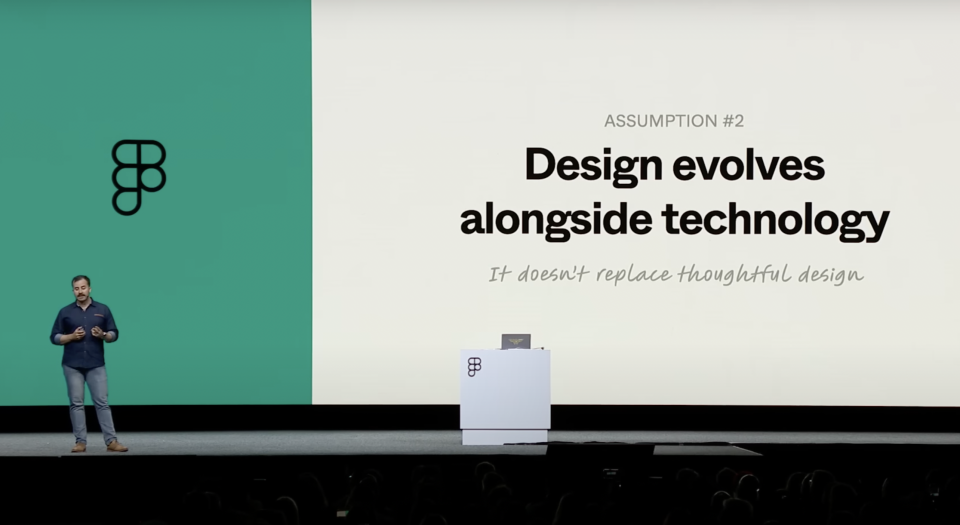"I do think jobs will change" – Figma on the future of design and AI

At last month's Config event in San Francisco, collaborative web design platform announced a bunch of exciting new features for designers, including Variables and a brand new Dev Mode. It also announced that it has acquired Diagram, "one of the most promising startups building at the intersection of design and AI."
Diagram grew from a GPT-3-generated Figma plugin created by founder Jordan Singer, which could create design ideas from a single prompt. According to Figma's VP of Product Design, Noah Levin, the tools sent #DesignTwitter ablaze.
While Figma has remained fairly tight-lipped on specific AI-powered features that might ship in the near future, it has shared that it is currently in a "discovery phase", exploring how AI might help users generate early ideas via prompts, or speed up the design process by tapping into your existing designs to deliver recommendations. We spoke to Levin at Config 2023 to find out more about how AI might influence the future of Figma. (For the full lowdown on the web design tool, check out our Figma review.)

How is Figma planning to integrate AI in the near future?
Our philosophy is that AI is something that doesn't support just one phase of the design process. It's actually a platform, not a product, it's a set of things. First, we're thinking about how we can make AI better for brainstorming and collaborating. One example is clustering content. If you have hundreds of sticky notes, it's a lot easier to leverage AI to provide a summary of them. We have a lot more to come, some of which we're not ready to share yet, but it's super exciting to think about how much easier it'll make collaborating with large sets of content, which is what large language models are really good at.
In terms of designing itself, we think AI can help you get started. It can help you create variations, it can help you complete end-to-end flows. Rather than having to sift through 1000s of components, we can actually predict and suggest things based on the context of your screen – so you can spend less time kind of like wrestling with rectangles and just setting up more of what the actual flow is for people and have like higher level discussions and debates.
What attracted Figma to Diagram?
They've been around for over a year, building on a bunch of different products. Their first set of products did a lot of things to automate Figma processes, and those are out in the world today – these are plugins like Automator. They shifted to AI six months or so into their journey when they realised how powerful the technology was. But because they couldn't build on Figma itself, they had to use a plugin. So the acquisition is extremely exciting to both of us, because they won't feel limited to only that surface, they can instead think more holistically about AI. And we brought them in to do exactly that.
How do you think the rise of AI will affect your team?
I do think jobs will change. To be clear, I don't think it's going to destroy jobs. I think the best way to look at this is to think about moments in time where this these kinds of shifts have happened. If you believe that design is just simply illustration or pushing pixels, then sure, that job might become irrelevant. But we don't believe that design is that – we believe that design is solving problems and using whatever tools we have available to us to build software that actually helps people. And so our belief is that it's something that evolves. The industry evolves alongside this technology, it isn't replaced by it.
But AI can actually like help you move up the stack from, say, atoms to patterns, where you're assembling screens together much faster. So, sure, a designer may not be pushing pixels around anymore, they might be just assembling content in a flow. And technology gets easier to build – even on the engineering side, there's plenty of great articles about how our engineers use with with co-pilot. That doesn't mean that those engineers aren't there, they're still the ones controlling it and manipulating it to do whatever they need. And so my belief is that it's a tool that we have access to that helps our job, it doesn't remove it or replace it.
Is AI generally misunderstood right now?
We're treating it now as if it's this huge, new thing, when you can just kind of broaden it to; how is technology serving people? Mostly when people say 'AI' now, they're referring either ChatGPT, or the more specific implementations from companies like OpenAI. I think where it's misunderstood is if people come out with a giant launch, and suggest they've changed the future of our products – as though that future can be seen, when actually they're just guessing. I would feel sceptical of a company that has a very articulate, perfect vision.
Instead, I think the way to do it is to approach it day-by-day, to start to solve problems that people need rather than blindly apply it. Think about even venture capital right now – if you don't have the phrase 'AI' in your deck, you won't get money. Personally, I am excited by it – even though things can get overhyped. I do think that this is a kind of a groundbreaking thing, and I haven't really felt that in my career since perhaps the shift to mobile. So it's definitely a big thing. But I definitely don't think people should approach with so much immediate conviction something they just got access to a few months ago.

